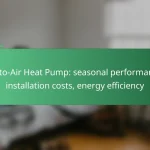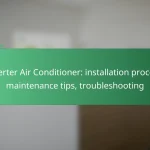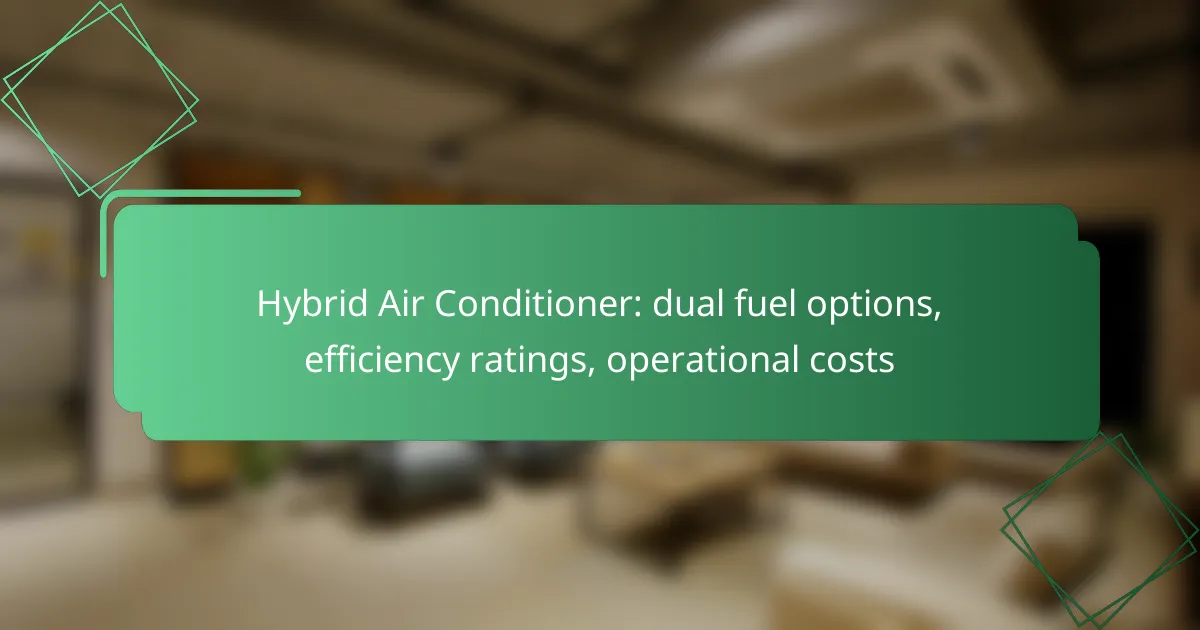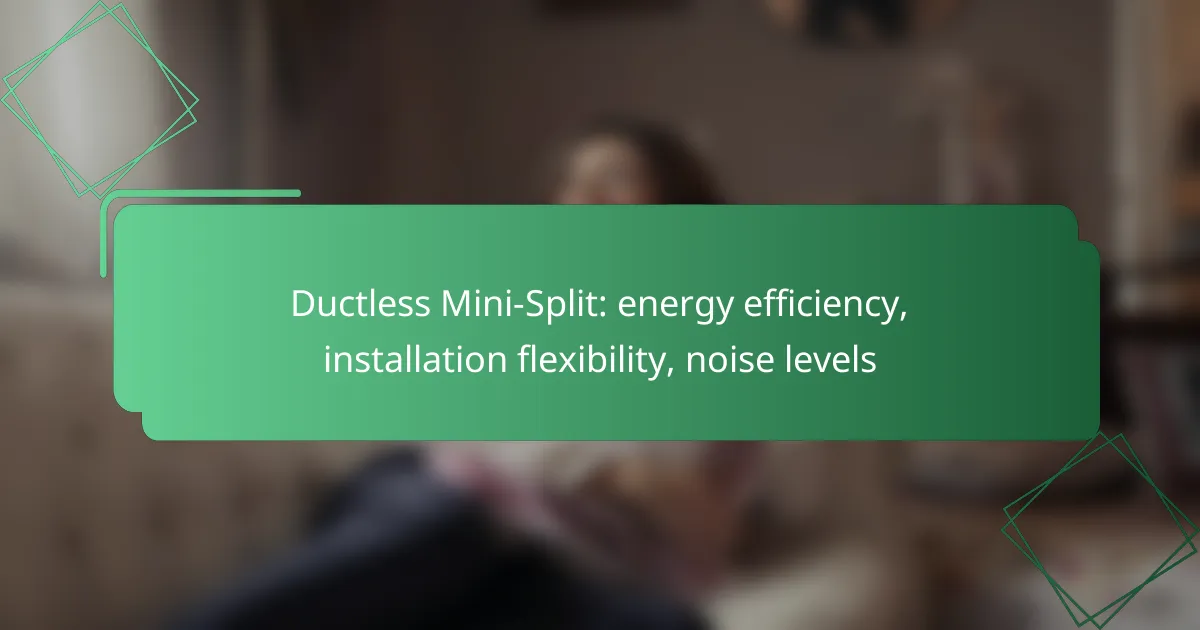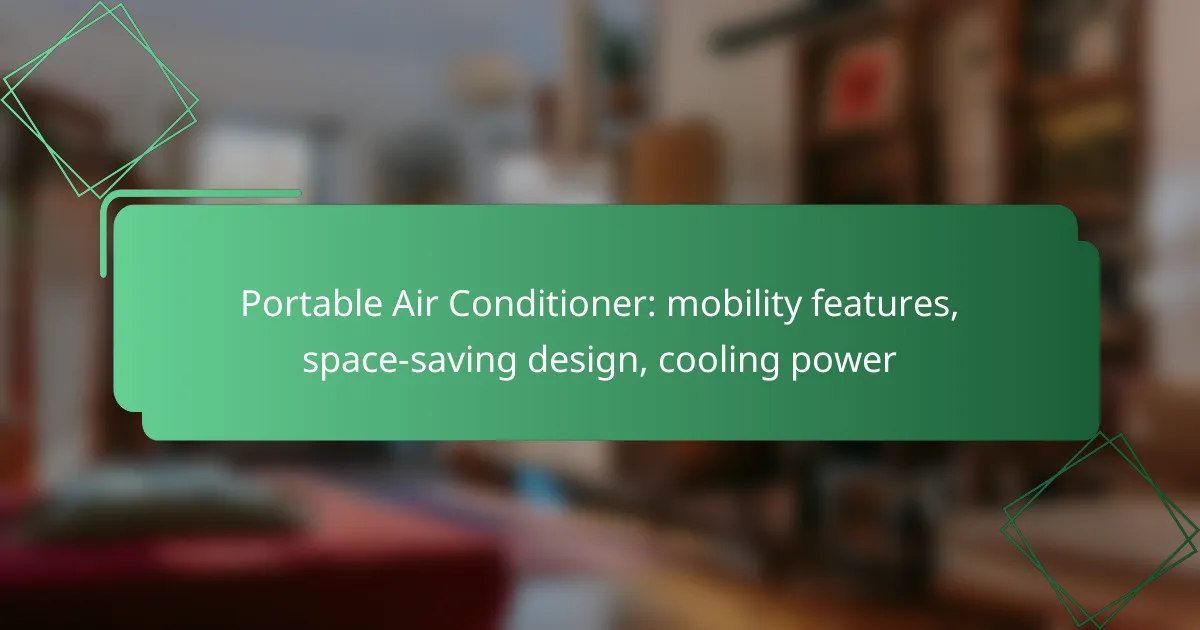Hybrid air conditioners utilize a combination of electricity and gas to enhance heating and cooling efficiency, making them an excellent choice for energy-conscious consumers. By automatically switching between fuel sources based on outdoor conditions and energy prices, these systems optimize operational costs while maintaining comfort. Understanding efficiency ratings, such as SEER and EER, is essential for comparing models and selecting the most cost-effective option.

What are the benefits of hybrid air conditioners in the UK?
Hybrid air conditioners offer a combination of energy sources, typically electricity and gas, to optimize heating and cooling efficiency. In the UK, these systems can significantly enhance comfort while reducing operational costs and environmental impact.
Energy efficiency
Hybrid air conditioners are designed to maximize energy efficiency by switching between electric and gas power based on demand and outside temperatures. This flexibility allows them to operate more efficiently than traditional systems, especially during peak usage times.
Many models achieve high Seasonal Energy Efficiency Ratios (SEER), often exceeding 20, which indicates superior performance. Homeowners should look for units that meet or exceed the UK government’s energy efficiency standards to ensure optimal performance.
Cost savings
By utilizing both electric and gas energy, hybrid air conditioners can lead to significant cost savings on utility bills. During milder seasons, the system can rely more on electricity, which is often cheaper, while switching to gas during colder months when heating demands are higher.
Users can expect to save anywhere from 20% to 50% on their annual heating and cooling costs compared to conventional systems. Additionally, government incentives may be available for energy-efficient installations, further enhancing savings.
Environmental impact
Hybrid air conditioners contribute to a lower carbon footprint by using cleaner energy sources more effectively. By optimizing energy consumption, these systems can significantly reduce greenhouse gas emissions compared to traditional heating and cooling methods.
In the UK, where there is a strong emphasis on reducing carbon emissions, adopting a hybrid system aligns with national goals for sustainability. Homeowners can feel good about their choice, knowing they are contributing to a greener environment while enjoying efficient climate control.

How do dual fuel options work?
Dual fuel options in hybrid air conditioners combine gas and electric power sources to optimize energy efficiency and operational costs. These systems automatically switch between fuels based on factors like outdoor temperature and energy prices, ensuring effective climate control while minimizing expenses.
Gas and electric integration
Gas and electric integration in hybrid systems allows for seamless operation between the two fuel types. When outdoor temperatures are mild, the electric heat pump typically operates, providing efficient heating or cooling. As temperatures drop, the system can switch to gas, which often provides more effective heating in colder conditions.
This integration helps homeowners take advantage of the lower operational costs associated with gas during peak heating seasons while still benefiting from the efficiency of electric systems during milder weather. The choice of fuel can significantly impact energy bills, making this flexibility valuable.
Switching mechanisms
Switching mechanisms in dual fuel systems are designed to automatically select the most cost-effective energy source. Many systems utilize smart thermostats that monitor outdoor temperatures and energy rates, allowing for real-time adjustments. This ensures that the system operates at peak efficiency, reducing energy waste.
Homeowners should be aware of the potential for manual overrides in some systems, which can be useful during extreme weather or specific energy price fluctuations. Regular maintenance and monitoring of the switching mechanism are essential to ensure optimal performance and to avoid unnecessary costs.

What are the efficiency ratings for hybrid air conditioners?
Efficiency ratings for hybrid air conditioners are crucial for understanding their performance and energy consumption. These ratings, primarily SEER and EER, help consumers compare different models and make informed choices based on energy efficiency and operational costs.
SEER ratings
Seasonal Energy Efficiency Ratio (SEER) measures the cooling output of an air conditioner over a typical cooling season divided by the energy it consumes in watt-hours. Higher SEER ratings indicate better energy efficiency, with modern units typically ranging from the mid-teens to over 20. For instance, a unit with a SEER rating of 16 can be significantly more efficient than one rated at 13.
When selecting a hybrid air conditioner, aim for a SEER rating that meets or exceeds local energy efficiency standards. In many regions, a SEER rating of 14 or higher is recommended for optimal performance and cost savings.
EER ratings
The Energy Efficiency Ratio (EER) measures the cooling output during peak conditions divided by the energy consumed. Unlike SEER, which averages efficiency over a season, EER reflects performance at a specific temperature, typically 95°F (35°C). EER ratings can help evaluate how well a unit performs under extreme conditions.
For hybrid air conditioners, an EER rating of 12 or higher is generally considered efficient. This rating can be particularly important in areas with high temperatures, as it indicates how effectively the unit will operate when demand is at its peak.

What are the operational costs of hybrid air conditioners?
The operational costs of hybrid air conditioners encompass installation, maintenance, and energy consumption expenses. Understanding these costs can help homeowners make informed decisions about their HVAC systems.
Installation costs
Installation costs for hybrid air conditioners can vary widely based on system type and home size. Typically, homeowners can expect to pay anywhere from a few hundred to several thousand dollars for installation, depending on the complexity of the setup and local labor rates.
It’s advisable to obtain multiple quotes from licensed HVAC contractors to ensure competitive pricing. Additionally, consider any available rebates or incentives for energy-efficient systems, which can help offset initial expenses.
Maintenance costs
Maintenance costs for hybrid air conditioners generally include routine servicing and repairs. Homeowners should budget for annual maintenance, which typically ranges from $100 to $300, depending on the service provider and specific system requirements.
Regular maintenance is crucial to ensure optimal performance and longevity. Neglecting maintenance can lead to higher repair costs and decreased efficiency, so scheduling annual check-ups is a wise investment.
Energy consumption costs
Energy consumption costs for hybrid air conditioners depend on usage patterns and local energy rates. These systems can be more efficient than traditional units, potentially resulting in savings of 20-50% on energy bills compared to conventional air conditioning systems.
To estimate energy costs, review your local utility rates and calculate expected usage based on your climate and system efficiency ratings. Monitoring energy consumption can help identify trends and areas for improvement in energy efficiency.

How do I choose the right hybrid air conditioner?
Choosing the right hybrid air conditioner involves assessing your specific cooling and heating needs, considering efficiency ratings, and evaluating operational costs. Focus on the size, capacity, and brand reliability to ensure optimal performance and cost-effectiveness.
Size and capacity considerations
When selecting a hybrid air conditioner, size and capacity are crucial. The unit should match the square footage of your space; typically, a unit with a cooling capacity of 20,000 to 30,000 BTUs is suitable for larger rooms, while smaller spaces may require 10,000 to 15,000 BTUs.
To determine the right size, consider factors like insulation quality, ceiling height, and local climate. An oversized unit can lead to inefficient operation and higher costs, while an undersized unit may struggle to maintain comfort levels.
Brand comparisons
Different brands offer varying features, efficiency ratings, and warranties for hybrid air conditioners. Leading brands like Trane, Carrier, and Lennox are known for their reliability and energy efficiency, often boasting SEER ratings above 16.
When comparing brands, also consider customer service, availability of parts, and installation costs. Reading reviews and seeking recommendations can help identify which brand aligns best with your needs and budget.

What are the top hybrid air conditioner brands in the UK?
The leading hybrid air conditioner brands in the UK include Daikin, Mitsubishi Electric, and LG. These manufacturers are known for their innovative technology, energy efficiency, and reliable performance, making them popular choices for homeowners seeking dual fuel options.
Daikin
Daikin is renowned for its advanced hybrid air conditioning systems that seamlessly integrate heat pump technology with traditional gas or electric heating. Their units are designed to optimize energy efficiency, often achieving seasonal efficiency ratings that exceed industry standards.
When considering a Daikin hybrid system, look for models that offer smart controls and compatibility with renewable energy sources. This can significantly reduce operational costs and enhance overall comfort in your home.
Mitsubishi Electric
Mitsubishi Electric offers a range of hybrid air conditioners that are particularly noted for their reliability and quiet operation. Their systems typically feature inverter technology, which allows for precise temperature control and improved energy savings.
Potential buyers should evaluate the specific models available, as Mitsubishi Electric provides options tailored for various home sizes and heating needs. Their units often come with extensive warranties, adding to their appeal for long-term investment.
LG
LG’s hybrid air conditioning systems are characterized by their sleek design and user-friendly interfaces. They incorporate dual fuel capabilities, allowing homeowners to switch between electric and gas heating based on efficiency and cost-effectiveness.
When selecting an LG hybrid air conditioner, consider the energy ratings and available features such as Wi-Fi connectivity for remote control. This can enhance convenience and help manage energy consumption effectively, leading to lower utility bills.

What are the installation requirements for hybrid air conditioners?
Hybrid air conditioners require specific installation conditions to function effectively. These include adequate space, proper electrical connections, and suitable ductwork to accommodate both heating and cooling systems.
Space requirements
Installing a hybrid air conditioner necessitates sufficient space for both the indoor and outdoor units. Typically, the outdoor unit should be placed in an area with good airflow, free from obstructions, and ideally on a concrete slab or a sturdy base.
Indoors, the unit should be installed in a location that allows for efficient air distribution throughout the space. This often means ensuring that the unit is not too close to walls or furniture, which can impede airflow. A clearance of at least 12 inches around the unit is generally recommended.


